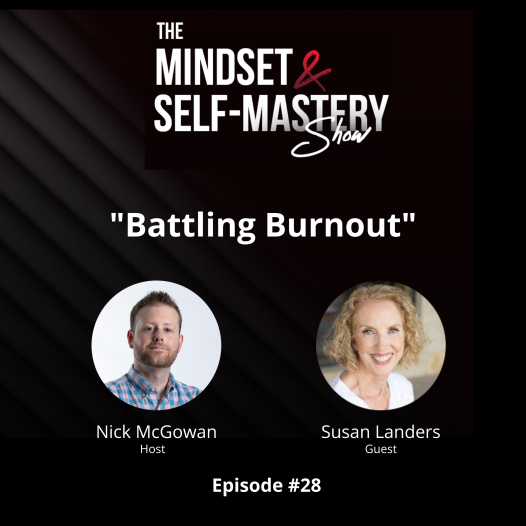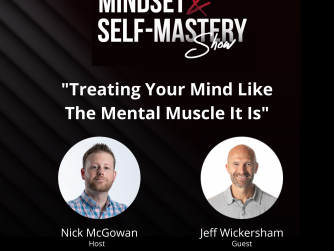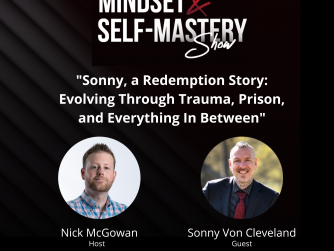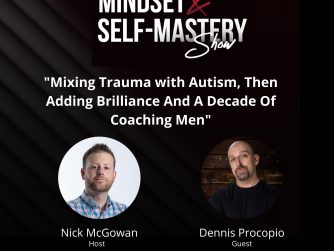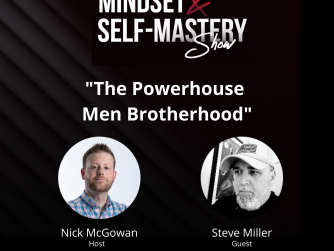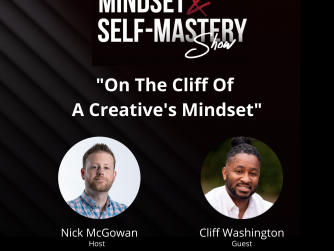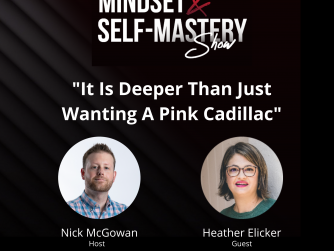Episode summary: Susan was a neonatologist for 34 years while also raising three children. She says she gave all she had to medicine and motherhood.
For most of her career, she kept burnout at bay, but near the end of her career the excessive work hours, the constant stress, and the complex ethical cases began to weigh heavily on her.
She suffered through burnout, and afterward, it took nearly two years of self-care, cutting back hours, and a practice change to heal.

EPISODE TRANSCRIPTION
0:01
[Music]
0:08
hello and welcome to the mindset and self mastery show i’m your host Nick
0:13
mcgowan and on this show my guests and i unpack the stories that shape us and the lives that we lead on our path to
0:20
self-mastery today on the show we have Susan landers Susan was a nanitologist
0:25
for 34 years while also raising three children she said she gave all she had
0:30
to medicine and motherhood and for the most part of her career she kept burnout at bay but near the end of her career
0:36
the excessive work hours constant stress and complex ethical cases began to
0:42
really weigh heavily on her she suffered through burnout and afterwards it took her nearly two years of self-care
0:48
cutting back hours and a practice change to heal so let’s not wait any longer let the games begin
0:59
hey Susan welcome to the show how are you doing today oh i’m good Nick thanks thanks for having
1:05
me absolutely i appreciate you reaching out as soon as your information came through and i saw that you wanted to talk about
1:11
a subject that i think a lot of people get into but maybe don’t really think about it too much is that burnout and also the healthcare
1:18
side of burnout i was saying right before we uh we hit record here that i’ve got a good friend of mine who was
1:24
in the healthcare industry and is actually no longer in healthcare and part of the reason was for the burnout so Susan again thank you for being on
1:30
the show why don’t you kick us off tell us who you are what you do for a living and one
1:36
thing that most people don’t know about you well i am retired i used to be a neonatologist
1:43
that’s a pediatric specialist who takes care of critically ill newborns and premature infants in the
1:50
nicu and i did that for 34 years and i loved it and i practiced in
1:55
academic medicine for a while i practiced in private practice i worked in
2:01
nationalized medicine with the american academy of pediatrics my husband is also a physician so our
2:08
whole lives were wrapped around medicine uh i also raised three children they’re
2:14
all grown now they’re all young adults what i’m doing now um after retirement
2:20
is i have written a book and i am talking to younger people about
2:28
particularly working mothers about working mother career burnout
2:34
i went through working mother burnout in my 40s after the birth of my third child and
2:40
then i went through physician burnout again when i was 62
2:46
before i retired it was the reason i retired early actually so
2:52
i enjoy telling stories to younger people younger professionals especially
3:00
career moms because they are so hard on themselves and they’re juggling so many
3:06
different things right now the dads are too but i think the moms are carrying it a bit heavier and
3:13
they really are struggling to make it all work
3:19
and to feel like they can be an okay mother when in fact they’re probably doing a great job
3:25
having a job having a family having a marriage keeping it all together it’s
3:31
it’s really no easy feat the way women go at it is
3:36
a little bit of a problem we want to be super moms and i was like that when i was a young
3:43
doctor and i got married and i had children i was going to be super mom and i was going to read all the books
3:50
and and do everything perfect with parenting and i found out that it was not easy and i didn’t know everything
3:57
i had a lot of friends who were in the same position we got married and had babies at the same time and so i was
4:04
able to have a you know a good support system and we helped each other through
4:10
learning how to be working mothers i think the pandemic really
4:16
hurt a lot of working parents they were isolated they were at home
4:22
with kids it’s some of the environments were very chaotic to hear them talk
4:29
and it made all the different jobs that they have to do seemed so much
4:35
more work they couldn’t send the kids to school they didn’t have child care they weren’t
4:42
going to the office to get a breather from the home life and so everything sort of
4:48
snowballed in the pandemic not just for people that have kids but everybody kind
4:54
of experienced some sort of effect like that but i would imagine it’s got to be pretty worse for people that have kids i know
5:00
there are people that are on my teams that i talk to where i can see a little body run by them in the background or
5:07
something that goes on and that’s just part of how it is at this point now you’ve touched on a couple of different types of people the people that are
5:14
doctors that actually need to get out of their house and go to the hospital or wherever their facility is those people
5:20
are in some ways able to get away from their kids but then they have to figure out how do they do and you know all of that then there are the people that are
5:26
still working from home now i talk to people that absolutely love working from home because they’ve
5:32
gotten into the rhythm of it but then there are other people that are like i need to get out of here and everybody
5:38
needs to get away from me who do you find that you typically end up kind of working with
5:43
which of those of the categories mostly the parents that
5:49
try to leave home and go do their jobs somewhere else
5:54
my daughter is a pediatric icu nurse she’s a great example of
5:59
the mom who has a career has two kids at home she and her husband are juggling
6:05
schedules who’s picking up who’s dropping off who’s making dinner
6:10
and she worked a lot of overtime during the pandemic but and and she saw some covic
6:17
cases and children that were very upsetting some children the same age as
6:22
her kids and that’s what you do when you’re a nurse or a doctor it it touches you
6:28
mostly when you see a patient that’s a lot like someone in your family and so
6:34
being a nurse or a doctor respiratory therapist and going into the hospital
6:40
during the pandemic because you had to work gave those people a sense of fulfillment
6:47
and it was rewarding but it was also scary and they were fearful in the early days
6:54
they didn’t want to catch the virus or bring it home to their family after the vaccines came out then there
7:01
was all this politicization of getting the vaccine or not and most
7:07
nurses and doctors happen to think vaccines save lives so there was this
7:14
conflict not only about having to go to work but dealing with people’s attitudes about
7:20
health care about vaccinations about school being out and so all of those
7:27
stresses were there in addition to working the job
7:33
are you going to catch the virus is your patient going to fuss at you um
7:39
is your family sick how’s your husband doing who’s paying for the child care
7:45
are you lucky enough to have a kid in preschool and it just went on and on and on like that for
7:51
folks who had to go into their workplace i suppose working from home was
7:58
somewhat of a respite for some people but it’s not easy i’ve talked to moms who
8:04
worked from home and they were ready to pull their hair out because they couldn’t get away from
8:10
their children and it was noisy and it was chaotic so i don’t think anybody had it easy
8:17
during the last few years i think everybody was stressed but in different ways i had it easy i was i was hanging out at
8:25
home with my husband you know taking walks so i didn’t have any hardship
8:32
but that’s because i wasn’t working anymore sure yeah i know on a different side of that
8:37
there were people that had hardships within their relationships with their marriages
8:43
or with the company that they’re working with i know obviously a lot of people were kind of shut out of work the restaurant
8:50
workers and people all that sort that could no longer work then there are people that were used to going into an
8:56
office used to doing a daily routine and that just completely changed and everybody had to figure out what that
9:02
new normal is i even i don’t even like saying the new normal sort of thing because here we are calendar year three and we’re still
9:09
trying to figure out how does this all look so the people that are going through the burnout and the people that have kind of gone through that stuff
9:16
at what point do you think they get to uh to a point in their brain where they say i have to actually do something
9:21
about this or are they not getting to that point and they’re almost getting suicidal with it
9:26
well there are different degrees of burnout among professionals and career folks parents
9:34
young adults middle-aged adults and it starts as
9:40
bad moods depression physical exhaustion
9:46
emotional overwhelm and you can just have a bad day at work or a bad day
9:51
working from home or a bad day in the icu and feel those things but
9:56
burnout takes you further it’s where you dread going to work
10:02
when you are working you’re cynical about it
10:07
you detach from your work in healthcare it was scary how people
10:13
felt detached and you and the full burnout syndrome is one that
10:22
pushes you to a place where you think you’re no longer making a difference that’s the real key if you if you are no
10:29
longer fulfilled in your work if you’re not making a difference
10:35
if you feel like what is the point of all this and you’re working 10 or 12-hour days
10:42
and you’re really trying hard hopefully people who are feeling these things physical
10:49
exhaustion emotional overwhelm deep personalization
10:54
detachment from their work and finally lack of fulfillment
10:59
if they feel this they need to pull back get some space
11:06
create some place for themselves whether it’s time off or outside of the
11:13
house or talking to a friend the point is it’s too much work it’s too
11:22
much stress and unmanaged stress from work burnout is a work-related syndrome Nick
11:30
and it comes because we let the stress in our workplace get to us
11:37
without managing it now the way to recover from burnout even
11:43
while you’re still working if you can’t make a space if you can’t take some time
11:50
off it’s to take care of yourself get the exercise you need get
11:56
the sleep that you need quit drinking alcohol so much
12:02
talk to a friend rally those support people in your life
12:08
um do something that’s really wonderful like excuse me play music
12:14
i started taking piano lessons and played handbells in that in a choir and a handball choir and the music just took
12:21
me away to place else and it was so heavenly that i thought i didn’t think
12:28
about all my stress i i got psychotherapy when i was burned out
12:33
and i would like to say that people who are listening who might be feeling symptoms of burnout
12:40
should talk to somebody not just their spouse not just their best friend
12:46
psychotherapy is really beneficial for folks who are going through burnout
12:51
because there’s so many issues that that pile up
12:57
to create that that stress that hadn’t been managed properly
13:02
and some of us really need the help of an objective person
13:07
who isn’t in the thick of it your spouse may recognize that you’re burnt out your partner may recognize that
13:14
and it creates conflict when doctors are surveyed about their
13:20
burnout they say more than half of them it’s affecting my relationships so they
13:26
know they have burnout and they know it’s making things worse at home so it’s not like they’re going to talk
13:32
to their spouse to get better physicians are typically
13:39
i can take care of it myself kind of mentality we we don’t show weakness we’re taught
13:45
as interns and residents not to show weakness we’re strong we can buck it up we can work 24 hours we can
13:52
do whatever needs to be done and then burnout that’s the opposite of what you should do
13:58
what you should do if you’re burned out is take some time back up look at the issues
14:04
take care of yourself hobbies music exercise rest
14:11
and those things are hard to do if you’re working 60 hours a week or if you’re if you’re working from home and
14:18
your three kids are in the other room and you’re trying to get your job done and you don’t know what you’re what
14:24
they’re doing are they online learning who’s fix and supper and it’s just
14:31
it’s just easy to imagine how job stress
14:37
overwhelmed so many people during the pandemic
14:42
yeah there’s a lot of overwhelm still that people are still kind of trying to figure out what does this need to look
14:48
like for them and you touched on a couple major things that just tie into kind of the blanket of depression
14:56
you know where people start to pull back from things or maybe they’re working a little too much and that’s just they’re
15:01
not processing through the stuff i know that there are times that i’ve been through depression there are times when you just don’t want
15:07
to do anything and that even kind of goes along with fixing the problems
15:12
so taking that first step of being able to talk to somebody can sometimes be a giant step for somebody to say that i
15:19
have a problem especially if they’ve been taught that you’ve got to be a superhero so how do you talk to those
15:24
people to help them get to the point where they can actually talk to somebody and put their superhero cape back
15:31
yeah well that’s a great question what you do is say hey
15:37
man i’m noticing that you don’t seem like yourself and
15:42
i’m here if you want to talk or hey i i noticed that you seem really stressed
15:49
more than usual and could we grab a lunch and maybe talk about things and
15:55
or well i’m really getting upset about all this work that’s piling up and
16:01
the kids aren’t learning well and could we get together and maybe um
16:10
share a coffee and compare notes it’s really hard uh and you know i
16:16
remember a partner telling me i think you’re burnt out but that’s all
16:21
he said he just blurted it out he didn’t say how are you how are you doing
16:27
you want to sit down and talk he just looked at me and said i think you’re burnt out and i went oh man maybe i am
16:35
but but that what the therapist say is we’re supposed to approach a colleague who might be burned out
16:43
with compassion and say i notice you’re not yourself can we talk
16:48
or if you want to talk i’m here offer a link
16:54
to someone or say boy i’ve been there too the reason that i’m having such an easy
17:02
time talking to working moms is that because i’ve already been through working on burnout and physician burnout
17:08
and i go you don’t want to go there it feels really bad you don’t want to do that so
17:14
i feel like i can give advice about how to get help
17:20
what the things you should do to get better but it always boils down to taking a
17:26
step you’re right the person that is burnt out has to want to get some help
17:36
and if they don’t then they’re not going to get anything out of it you know those people yeah they’ll get sicker they’ll get worse
17:42
yeah when i was born out my drinking really increased i used to drink a glass of
17:48
wine at night and when i was really burnt out bad i would drink two or three glasses my husband said i’m i noticed
17:54
you’re really drinking a lot more than usual i’m going i’m just trying to calm my nerves and calm the stress and my
18:01
daughter noticed it too mom why are you drinking so much so we notice these things in people that
18:08
are in our world we notice that their behavior is different we notice when they’re over stressed
18:15
we’ve got to be brave enough to say something about it i think there’s also the the fact that
18:23
sometimes those people are super stressed and they’re calling something out because they can see it in somebody but
18:29
not in them just like your partner you look burnt out he may have been burnt out and was just saying it because he’s
18:35
like well i don’t really want to talk about it but i got to be honest you look like how i feel
18:41
yeah maybe projection comes into it i don’t i don’t know that’s pretty pretty much over my head but
18:48
i do know that um we can be there for each other in our workplaces and provide
18:54
support there’s nothing better than saying wow i really understand what you’re
19:00
going through everybody likes to hear that everyone likes to know that their feelings are
19:08
understood yeah i i get that definitely everybody for the most part thinks that i’m unique
19:14
you don’t get what my problems are because they’re my problems but for somebody like yourself that goes i know exactly what your problems are because i
19:21
lived it and i’ve helped other people through it let’s actually take a little bit of a step back to that version of
19:27
you who was going through that burnout what are the things that you went through that you would tell other people
19:33
to be mindful of that are going through that same path and how to go about stepping outside of that well i
19:41
got help i was brave enough to talk to a psychotherapist i told my manager my medical director
19:48
that i was pretty fried and i needed to cut back my hours some people won’t be lucky enough to cut
19:54
back their hours but i had read that working less was an easy way to decrease the stress
20:02
and i changed my practice location i left the nicu i went to a low risk labor and delivery
20:09
unit and i took care of healthy mothers and babies
20:14
and it reminded me how much i loved newborns and mothers
20:20
and it got me out of the icu with all the stress and the monitors and the emergency deliveries and so those are
20:28
the two things that are that are necessary less work
20:33
and sometimes a different work location then the other things that i mentioned
20:39
self-care rest exercise hobbies music
20:47
in addition to therapy those are the things that you have to do and some people are too busy to do it but they’re
20:53
not going to get better if they if they don’t take care of themselves oh yeah you can only be too busy
21:00
i think when when people make that excuse of look i’m just too busy i i like to call people bs on that i’m
21:06
like i get it you just tell me no or like screw off or whatever because give me the real answer because that’s not
21:12
the real answer somebody said to me years and years ago and they were like look if your kid had a broken arm and somebody called you and said your kid’s
21:18
arms broke you’re gonna drop everything you’re doing you’re gonna go get your kid right you don’t have an excuse at that
21:23
point well you know i don’t have time like i i got other things i got to do or i got work or i got this it’s like no
21:29
your kid’s arm is dangling come get it yeah it must have something to do with
21:34
admitting that we’re not being our full selves when in fact
21:40
burnout is a mental health condition it’s now in the dsm-5
21:47
and who recognizes burnout as a mental health condition
21:52
and and there’s such a bad stigma about mental health mental illnesses in our country
22:00
that a lot of people think if they admit they have a problem that they’re going to be labeled as mentally ill or crazy
22:08
or less than or not good enough and so i understand why people are so hesitant to
22:16
bring it up but we’re we’re going to run ourselves into the ground as a culture as a
22:22
working culture if we don’t admit when we’re fried when we’re overdone
22:29
yeah it’s a very good point the the admittance of that you got to admit it to yourself you
22:35
stepped out and talked to your manager there are certain people in certain jobs that don’t want to have that
22:40
conversation with their manager they don’t feel comfortable to have that conversation with their manager you know
22:46
there’s another way to go about it almost all corporate jobs have hr
22:52
programs that offer employee assistance you could go to your hr department
22:59
without your manager knowing and you could hook up with or talk to
23:05
a therapist or a social worker or some kind of counselor and you might have
23:11
four visits or six visits or ten visits depending on what your employer offers
23:17
and even doing that would be helpful almost all of us i mean think i hope
23:24
people think about this go to your workplace and find out what kind of employee assistance program
23:30
there is maybe you could talk to somebody’s fix visit a friend of mine who’s a social
23:36
worker has now started working just with folks who get to her
23:43
through employee assistance programs and it’s men
23:48
predominantly who don’t want to admit they have a problem but they know they’ve got a problem and they want to
23:55
kind of secretively look at the issues and she helps them pretty quickly figure
24:01
out what’s going on and how to go about getting better so that’s one thing that people can do that’s such a big thing to
24:08
be able to go talk to somebody and you kind of hit hit that big piece there where
24:13
men and women i get that you come from the woman’s side of this and especially working with working moms and all
24:19
as a as a men’s mindset self-mastery coach and obviously having the podcast i understand what that looks like on the
24:26
men’s side of that and i understand what that’s like to go i don’t want to have this conversation
24:31
because i don’t actually want to admit to myself there’s a problem but to be able to do a research and see what you
24:37
have in your hr portal or whatever i can almost guarantee that most people will be shocked at the amount of actual
24:43
resources they have like you said four or five six sessions something like that i think that’s kind of a standard thing
24:49
for most companies and that’s probably available without your manager knowing okay aren’t those hr people real
24:56
secretive and they keep everything confidential and and that makes people feel a lot better
25:03
my husband uh said i was burned out too and i i lift the symptoms off and he
25:08
said well maybe i wouldn’t burn out maybe i was just tired of working i said honey there’s a
25:14
big difference between burnout and being tired of working and so we talked about it um
25:20
and and it was a great conversation because our approaches to being stressed
25:25
at work he just wanted to retire early and i just got all the crazy burnt out
25:31
so it’s really interesting yeah that’s an interesting uh sort of scenario how would you suggest that
25:37
couples go about having that conversation or even stepping out and saying hey i think i may have a problem
25:43
the best way is to talk to your spouse or your partner sit down and say
25:49
i don’t want you to fix this for me i just want you to understand
25:54
it’s just basic marriage 101. i have these feelings they’re driving me crazy
26:01
you’re my partner i need you to understand especially if you decide you’re going to
26:07
do something about your burnout if you’re going to get some help or if you’re going to change your schedule if
26:12
you’re going to change your job or your job location your spouse or partner has
26:17
to know that and probably needs to understand why and so it really boils down to you’ve got to
26:25
talk about it you’ve got to sit down without the kids somewhere
26:30
private and talk about your feelings and men don’t like to do that as much as women
26:38
do but they can and wives and partners can encourage men to talk about their
26:45
feelings i’m positive i mean i’ve i’ve had lots of partners who didn’t want to talk
26:51
about things like if we lost a baby or there was a very difficult code
26:56
and afterwards and say can we can we debrief on that code and then we’ll it’s okay i don’t wanna go no we have to talk
27:03
about that so if you encourage people to sit down and talk they will
27:11
yeah that’s kind of like stretching that muscle because once you start to open it up you start to have a conversation then
27:16
it becomes easier to have that next conversation then it becomes easier to say hey i just got home i’m a little
27:22
stressed here’s why and i think there’s also that balance where you don’t want somebody to just complain the entire
27:28
time nobody just wants to listen to somebody complaining but if they’re processing through and it’s an allocated
27:34
time to be able to do that that can be a beautiful situation in a relationship to be able to build that and know that hey
27:41
we’re in this thing together it’s not just you by yourself right i agree and my husband said why
27:47
are you why are you bringing hand bells that’s crazy you’re not a musician i said i know
27:53
but the music is so amazing it just makes my brain just turn off and
28:00
i don’t have to think about anything else and he said oh i never thought about
28:05
that i said yeah it’s just like this amazing step away from
28:11
life and so he asked me he made a snide comment why are you
28:17
doing that because i’m no musician and i answered him and once i explained why i
28:22
was doing it he got it he understood makes sense it also sounds like there’s
28:28
a little bit of a judgment there at first why are you doing such a thing yeah and then when you make that
28:33
that case of why you’re doing it go oh yeah that makes total sense and it’s a nice little reset so being able to find anything that is a
28:40
reset sometimes uh there are times where i get frustrated deal with business or work or something
28:47
happened or anything could happen and i know to get out of this space and just taking that little step to
28:53
actually step out of your space don’t just sit in your anger or your frustration you got to be able to get
28:58
out of it and then being able to have a conversation and say hey i’m a little pissed here’s what’s going on here’s what happened
29:04
most times you can talk through it and just be like i’m good now thanks i got it off my chest
29:10
other times you actually need to process through are there any um stories that you can tell us of people
29:15
that you’ve connected with that you’ve seen kind of a major breakthrough especially in burnout
29:21
yes i talked to a bunch of neonatal nurse practitioners recently and their manager who has just
29:30
completed her phd in nursing after my presentation she came up to me and said
29:35
would you be my therapist and i said no they’re going to be your therapist i i’m not a therapist but you know i’m a
29:42
retired neonatologist he said i think i’m really burnt out and i said well okay we’ll sit down and talk about that
29:49
but you’ve got to get some help and you’ve got to figure out how to cut back your hours and
29:55
so the point of this is i gave her permission to talk about it by giving a presentation
30:02
some of the other nurses chimed in yeah i don’t like this or i don’t like that but but she the manager she was really
30:09
burnt out and she came up to me afterwards and i helped her kind of make a short-term plan of how
30:16
she was going to deal with it Susan it has been wonderful to have you on i appreciate you jumping on and
30:22
talking to us and for for doing the work that you’re doing burnout is in some ways
30:28
a hidden sort of uh frustration for people where they don’t
30:34
really think that it’s real some people think it’s too real and some people don’t actually know that
30:39
it’s happening to them they just feel maybe i’m a little off maybe i’ve just been off for a couple weeks or a couple
30:44
of months so that’s that’s key and Susan can you tell us one piece of advice you
30:51
would give somebody that’s on their path towards self mastery i would say
30:56
write down your goals be very specific and prioritize them and
31:02
put yourself on the list it took me
31:08
until i was 40 to learn to do that i think a lot of over achieving
31:15
motivated people professionals whether it’s medicine or business push themselves so hard
31:23
they know what their goals are and they clear about priorities but they themselves are not on their list
31:31
and and that’s part of why we’re in such trouble with burnout so i say on the road to self mastery
31:38
learn how to take care of you you’ve got to take care of you to make everything else work
31:46
yeah absolutely you have to come first before anybody else can it’s almost like
31:51
when you’re on an airplane they say put your mask on before you put anybody else’s on
31:56
yeah that’s a silly that’s a silly analogy but it’s really true and
32:03
i just in retrospect i think that i learned to do that very late in my
32:09
career i was in my 40s and maybe i forgot how to do it in my 60s and maybe
32:15
that’s why i got burnt out there were some very stressful cases but
32:21
i wasn’t taking very good care of myself so on the road to self-mastery learn how to
32:27
take care of yourself that’s beautiful so hey tell us where people can find the
32:33
book and where they can connect with you i have a website Susanlandersmd.com
32:40
and if you go to that website forward slash burnout in caps
32:45
there’s a checklist there to see if you are stressed okay or burn out
32:52
i also have resources on my website and i write a blog there
32:58
i’m on instagram and facebook and all the social media links are on my website
33:03
so check out the burnout checklist Susanlandersmd.com
33:09
forward slash burnout that’s perfect and that’s that’s a great checklist so everybody go ahead check
33:15
that out i’m sure it’s probably going to take you a couple minutes to just go through it and see you might be depressed you might also be burned out
33:21
so again Susan thank you so much for being on the show i appreciate your time so thanks Nick this was fun i enjoyed
33:27
talking with you [Music]
33:37
another great conversation on today’s episode of the mindset and self-mastery
33:42
show burnout is a real thing folks it’s not some that someone came up with
33:48
because they just didn’t want to do something well right sometimes maybe that’s the case
33:54
but that’s really because you’re not processing through what’s going on in life but either way burnout can and
34:00
should be dealt with way before it consumes you so what did you think about today’s episode i’d love to hear your
34:07
thoughts on the topic of burnout and what else we got into today if you enjoyed the episode please jump
34:13
over to itunes subscribe rate and leave a 5 star review and if you really
34:18
enjoyed the show today go ahead and share with some friends and family and people that you care about they’ll appreciate you for sharing it with them
34:25
check out the show notes for more info contact info for Susan and check out other episodes on the mindset and
34:34
selfmasteryshow.com as well as our youtube channel just go to youtube and look up the mindset and self mastery
34:40
show you’ll see hundreds of videos clips on there all waiting for you thanks again Susan for being real for being
34:47
honest and for being vulnerable with us and sharing some strategies that have helped you to get away from burnout and
34:52
continue on your path to self-mastery and thank you to you for spending some time with us today
34:58
and for being interested in learning how you can stop yourself from being burnt out
35:04
and with that remember your mindset matters and so do you
35:18
you
